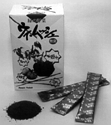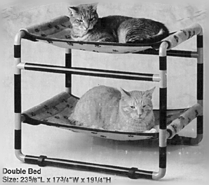| Neko Ningyo | Doggy Breath | Watch The Birdie | Cat Bunkbed |
|---|---|---|---|
While Tokyoites buy their grand-daughters hina-ningyo for Doll's Day, cat lovers spoil their pets with a feline version (Ningyo no Mura, 3863-4711).
|
Oui Monsieur is a nutritious eight-vegetable doggy drink which claims to eliminate bad breath and body odor (Shizen Yakugaku Kenkyujo, 5389-6227).
|
A treat for cats -- 25 minutes of color, stereo footage of little birds and mice (Pet Heart Station, 0120-125-372).
|
For cats who like lounging within spitting distance of each other (Pet Heart Station).
|
Pet Health
dial-a-vet
 Pet Trivia
Pet Trivia